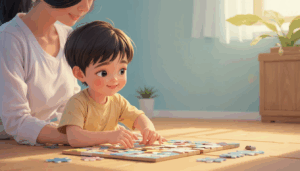This article was last updated on September 24, 2025

In today’s busy world where we get constant news and sometimes helicopter parents, a lot of smart people worry that kids are becoming really nervous. Sure, phones and screens matter, but a big problem is actually how some parents protect kids too much. When kids don’t get to face hard things or learn from mistakes, they often miss out on being tough, having self-belief, and learning to be independent. What about instead of shielding them, we help kids feel like they can handle life on their own? Really interesting question, right?
Stress? What it does to a Young Mind 🧠
Stress does a lot in a growing mind. Brain expert Sonya Lupien says situations are really stressful because of four things: New stuff, Surprise, Danger (or looking like it), and when you feel you’ve got no control. The trickiest one? When things happen but you can’t do anything about it.
When feeling in control, though, our main thinking part of the head, the factor responsible for sorting stuff clearly and seeing from the side, gets activated. It can calm stress down and push people to find ways through trouble. Having this skill makes you really tough. People learning this show good ties between the learning part and the scare-stopping bit in your noggin — it means they usually have good head and heart health. Allowing kids to solve problems, make mistakes and grow makes them better at controlling personal feelings and thoughts. A weak sense of control, on the flip side, may lead to feeling stuck, jittery, and pressurized.
Evolving from Parent to Friendly Advising 🤝
A big thing with making kids want to act by themselves is saying stuff like homework is theirs to do — meaning it isn’t a parent’s worry. Guide but don’t boss. As a mom or dad, you aren’t there to lead like a manager but advise like a guide. Grappling with them isn’t going to work — love them enough to step back. Send love by saying, “Your homework, it’s for you to handle. Anyways, I’m your supporter.”
Try helping instead of pestering. Maybe offer to be a “homework supporter” at chosen times and let kids know you’re available, but not taking over their task. Balancing help with responsibility is key. A test in Child Mind Learning found keeping too much order increases the kids’ homework involvement but can weirdly cut into learning and skill development over time.
Growing a Positive Thinking and Self-Thinking Mindset for Empowerment 🌱
To want to learn because it’s a feeling or emotion is key. You need three things: self-made choices, being with peers, and believing in one’s potential. Learning that growth happens through effort helps much of this. When kids understand that trying hard, not just natural quickness, makes triumph a sweet gain, it lays the foundation for success. Compared to believing laziness sharpens nothing, effort builds achievement.
Giving gifts is alright but only at chosen times. It can hurt the inner drive for a work ethic. The target is eventually slipping into attention-holding, meaningful, and impactful love-filled practices during their teens — like gaming that is mindful, not mind-numbing. Focus on activities that work out the brain cordially, like dance, art, or creative hobbies. These create a healthy striving mind, meaningful moments, and lasting progress.
When we get anxious about our kids’ future, it’s important to have a longer view of things. Often, what’s making us worry now is really about tomorrow. You know that thing where you imagine the worst happening? Let’s try not to do that. Most kids don’t stay lazy forever. A nice thing parents can do is manage their own worries and stop thinking the worst will happen. Trust that one day they’ll find what they love and where they’re going.
Let kids learn from their mistakes. Wisdom comes from choosing wrong and dealing with what happens next. How a parent reacts to these mix-ups really matters. When a child screws up, starting with understanding instead of getting angry shows them support, not punishment. It trusts them to own their mistakes and be resourceful. By letting kids decide on their own things early, you show you believe in them — kids knowing you think they can lead their own lives.
Ideas & Talking Points:
- Offer support, don’t order: Say stuff like, “Can I help here?” or “I think I may have some thoughts; want to hear them?”
- Say they can choose: Use words like, “I can’t force you to do it,” to stop a tug of wills. This says you know they’re the one who can decide, not you making them do what you want.
- Ask them what they think: You could ask, “Is there anything you’d like to control more?” or “What do you want to get from this?” This makes them think about what they want.
- Show care and warmth: Just hanging out with your kids can say they matter a lot, not just their grades. Isn’t time together more meaningful than marks?
Does making space for kids to fail help them grow? Could showing more warmth change how they see missteps?
References:
- Lupien, S. J., et al. (2009). The effects of stress on human memory and the hippocampus. Hippocampus, 19(11), 1017–1026. https://onlinelibrary.wiley.com/doi/abs/10.1002/hipo.20624
- Silinskas, G., et al. (2013). Parental involvement in homework: An integrated model of motivational and learning strategies, academic performance, and engagement. Journal of Experimental Child Psychology, 114(1), 1-18. https://www.sciencedirect.com/science/article/abs/pii/S002209651200021X
- Dweck, C. S. (2006). Mindset: The New Psychology of Success. Random House. https://www.mindsetonline.com/whatismindset/thegrowthmindset/
- Larson, R. W. (2000). Toward a psychology of positive youth development. American Psychologist, 55(1), 170-183. https://psycnet.apa.org/fulltext/2000-02205-010.html
- Grolnick, W. S., & Ryan, R. M. (1989). Parent styles associated with children’s self-regulation and competence in school. Journal of Educational Psychology, 81(2), 143–154. https://psycnet.apa.org/record/1989-25367-001






